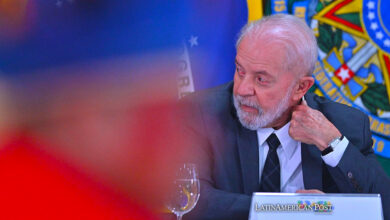Latin America’s Pivotal Challenge in Confronting the Climate Crisis
Stakeholders from governmental bodies, international institutions, corporations, researchers, and civil society converged at the I Latin American Green Economy Forum in São Paulo, Brazil, to deliberate and collaborate on strategies for tackling critical issues such as decarbonization, enhanced waste and water management, and ensuring food security within the backdrop of a planet-wide climate emergency.

Photo: EFE/ Isaac Fontana
The Latin American Post Staff
Escucha este artículo
Leer en español: El desafío fundamental de América Latina para enfrentar la crisis climática
A just transition that combines social progress and economic development is the paramount challenge facing Latin America and the Caribbean in addressing a climate crisis that is already impeding the fight against hunger in the region. This was one of the conclusions reached by various government bodies, international institutions, businesses, researchers, and civil society representatives who participated in the I Latin American Green Economy Forum, organized by the EFE Agency in São Paulo, Brazil.
Over five panels, experiences, and solutions were debated on promoting decarbonization, improving waste and water management, and ensuring food security in a global climate emergency.
A New Perspective on Waste and Water
Latin America generates 230 million tons of urban waste annually, with only 5% being recycled, according to data from the Inter-American Development Bank (IDB) presented at the event. Faced with this scenario, Carlos Silva Filho, President of the International Solid Waste Association (ISWA), stressed the need to "advance toward a sustainable development model" because "a single planet Earth is not sufficient to meet our demands at the current pace."
The COVID-19 pandemic exacerbated the waste problem. Fernando Meier, President of the Swiss non-governmental organization (NGO) Ecotechsy, noted that the daily generation of medical waste per person worldwide increased from 0.7 to 2.5 kilograms during the coronavirus crisis.
Speakers also called for changes in water resource management in light of forecasts indicating that by 2050, half of the population will face water access problems, with the water cycle directly linked to climate.
This is already a reality in some parts of Latin America, where a quarter of the population lives in areas with water access difficulties. Ângelo Lima, Executive Secretary of the Brazilian Water Observatory, stated, "We have regions with plenty of water that, conversely, experience supply problems during the dry season."
Also read: Chronicle: This Is How The Climate Crisis Has Turned Canada's Forests Into Hell
Climate Crisis and Hunger
Related to water is food production, which is suffering "adverse and significant impacts" due to the climate crisis, even though the goal of ending hunger has not yet been achieved, as expressed by Mario Lubetkin, the representative for Latin America and the Caribbean of the United Nations Food and Agriculture Organization (FAO), speaking remotely. "It is particularly concerning that food security prevalence in the region is higher than the global average and particularly alarming that women suffer from it more than men," he added.
Eli Weiss, Head of the Sustainable Development Program at the World Bank in Brazil, also highlighted other difficulties, such as high internal inflation of food prices and high costs of agricultural inputs. In this regard, Floriano Pesaro, Director of Corporate Management at the Brazilian Agency for the Promotion of Exports and Investments (ApexBrasil), advocated for promoting economic growth that combines environmental and social responsibility and, in the case of Brazil, strategies to "keep the Amazon standing."
Attention to Amazon Communities
Regarding the Amazon, which is facing one of the worst droughts in decades, representatives of its communities called for more excellent logistical connectivity to address this and other issues in the biome. Valcléia Solidade, Superintendent of Sustainable Community Development at the Amazon Sustainable Foundation, emphasized that the world must "look with more respect and dignity upon traditional populations" and that "logistical connectivity" is one of the critical aspects.
However, a technological revolution and public-private financing are also required. Julio Meneghini, Director of the Research Center for Innovation in Polluting Gases at the University of São Paulo (USP), cited a positive example: a pilot project to build the world's first green hydrogen plant from ethanol, a biofuel made from sugarcane.
Despite this technological boost, former Peruvian Minister Manuel Pulgar-Vidal, a representative of WWF International and one of the architects of the Paris Agreement, stated that much of the region is still "trapped in the fossil fuel trap" due to abundant reserves. Pulgar-Vidal pointed out that many governments lack updated plans and have not understood that decarbonization is "more of an economic process than an environmental one."
In this regard, Gabriela Cañas, President of the EFE Agency, said remotely that "we are all obliged to urgently seek solutions" and "explore all possible alternatives to sustain human activity, restoring the health of the planet that hosts us."




